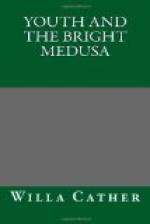When the musicians came out and took their places, she gave a little stir of anticipation, and looked with quickening interest down over the rail at that invariable grouping, perhaps the first wholly familiar thing that had greeted her eye since she had left old Maggie and her weakling calf. I could feel how all those details sank into her soul, for I had not forgotten how they had sunk into mine when I came fresh from ploughing forever and forever between green aisles of corn, where, as in a treadmill, one might walk from daybreak to dusk without perceiving a shadow of change. The clean profiles of the musicians, the gloss of their linen, the dull black of their coats, the beloved shapes of the instruments, the patches of yellow light on the smooth, varnished bellies of the ’cellos and the bass viols in the rear, the restless, wind-tossed forest of fiddle necks and bows—I recalled how, in the first orchestra I ever heard, those long bow-strokes seemed to draw the heart out of me, as a conjurer’s stick reels out yards of paper ribbon from a hat.
The first number was the Tannhauser overture. When the horns drew out the first strain of the Pilgrim’s chorus, Aunt Georgiana clutched my coat sleeve. Then it was I first realized that for her this broke a silence of thirty years. With the battle between the two motives, with the frenzy of the Venusberg theme and its ripping of strings, there came to me an overwhelming sense of the waste and wear we are so powerless to combat; and I saw again the tall, naked house on the prairie, black and grim as a wooden fortress; the black pond where I had learned to swim, its margin pitted with sun-dried cattle tracks; the rain gullied clay banks about the naked house, the four dwarf ash seedlings where the dish-cloths were always hung to dry before the kitchen door. The world there was the flat world of the ancients; to the east, a cornfield that stretched to daybreak; to the west, a corral that reached to sunset; between, the conquests of peace, dearer-bought than those of war.
The overture closed, my aunt released my coat sleeve, but she said nothing. She sat staring dully at the orchestra. What, I wondered, did she get from it? She had been a good pianist in her day, I knew, and her musical education had been broader than that of most music teachers of a quarter of a century ago. She had often told me of Mozart’s operas and Meyerbeer’s, and I could remember hearing her sing, years ago, certain melodies of Verdi. When I had fallen ill with a fever in her house she used to sit by my cot in the evening—when the cool, night wind blew in through the faded mosquito netting tacked over the window and I lay watching a certain bright star that burned red above the cornfield—and sing “Home to our mountains, O, let us return!” in a way fit to break the heart of a Vermont boy near dead of homesickness already.




